
The Kennedy family is an American political family that has long been prominent in American politics, public service, entertainment, and business. In 1884, 35 years after the family's arrival from County Wexford, Ireland, Patrick Joseph "P. J." Kennedy became the first Kennedy elected to public office, serving in the Massachusetts state legislature until 1895. At least one Kennedy family member served in federal elective office from 1947, when P. J. Kennedy's grandson John F. Kennedy became a member of Congress from Massachusetts, until 2011, when Patrick J. Kennedy II retired as a member of the U.S. House of Representatives from Rhode Island.
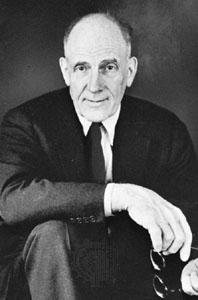
Wallace Kirkman Harrison was an American architect. Harrison started his professional career with the firm of Corbett, Harrison & MacMurray, participating in the construction of Rockefeller Center. He is best known for executing large public projects in New York City and upstate, many of them a result of his long and fruitful personal relationship with Nelson Rockefeller, for whom he served as an adviser.

Edward Moore Kennedy was an American lawyer and politician who served as a United States senator from Massachusetts for almost 47 years, from 1962 until his death in 2009. A member of the Democratic Party and the prominent political Kennedy family, he was the second most senior member of the Senate when he died. He is ranked fifth in United States history for length of continuous service as a senator. Kennedy was the younger brother of President John F. Kennedy and U.S. attorney general and U.S. senator Robert F. Kennedy. He was the father of U.S. representative Patrick J. Kennedy.
This section of the timeline of United States history concerns events from 1950 to 1969.

Max Abramovitz was an American architect. He was best known for his work with the New York City firm Harrison & Abramovitz.
In United States presidential elections, an unpledged elector is a person nominated to stand as an elector but who has not pledged to support any particular presidential or vice presidential candidate, and is free to vote for any candidate when elected a member of the Electoral College. Presidential elections are indirect, with voters in each state choosing electors on Election Day in November, and these electors choosing the president and vice president of the United States in December. Electors in practice have since the 19th century almost always agreed in advance to vote for a particular candidate — that is, they are said to have been pledged to that candidate. In several elections in the 20th century, however, competitive campaigns were mounted by candidates who made no pledge to any presidential nominee before the election. These anomalies largely arose from fissures within the Democratic Party over the issues of civil rights and segregation. No serious general election campaign has been mounted to elect unpledged electors in any state since 1964.

Nationwide Mutual Insurance Company and affiliated companies, commonly shortened to Nationwide, is a group of large U.S. insurance and financial services companies based in Columbus, Ohio. The company also operates regional headquarters in Scottsdale, Arizona; Des Moines, Iowa and San Antonio, Texas. Nationwide currently has approximately 25,000 employees, and is ranked No. 83 in the 2023 Fortune 500 list. Nationwide is currently ranked No. 21 in Fortune's "100 Best Companies to Work For".
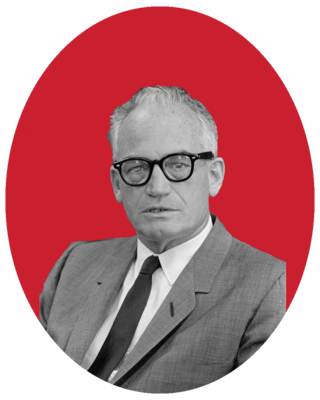
The 1964 Republican National Convention took place in the Cow Palace, Daly City, California, from July 13 to July 16, 1964. Before 1964, there had been only one national Republican convention on the West Coast, the 1956 Republican National Convention, which also took place in the Cow Palace. Many believed that a convention at San Francisco indicated the rising power of the Republican Party in the west.
David Matthew Cutler is the Otto Eckstein Professor of Applied Economics at Harvard University. He was given a five-year term appointment of Harvard College Professor, which recognizes excellence in undergraduate teaching. He holds a joint appointment in the economics department and at Harvard Kennedy School and the Harvard School of Public Health, is a faculty member for the Harvard Center for Population and Development Studies, and serves as commissioner on the Massachusetts Health Policy Commission.
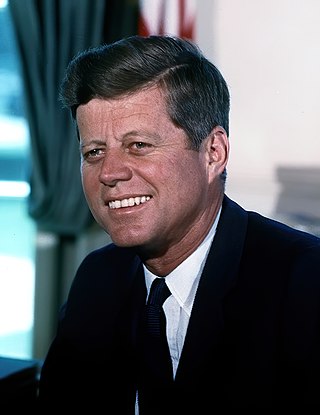
John Fitzgerald Kennedy, often referred to by his initials JFK and by the nickname Jack, was an American politician who served as the 35th president of the United States from 1961 until his assassination in 1963. He was the youngest person to assume the presidency by election and the youngest president at the end of his tenure. Kennedy served at the height of the Cold War, and the majority of his foreign policy concerned relations with the Soviet Union and Cuba. A Democrat from Massachusetts, Kennedy served in both houses of the U.S. Congress prior to his presidency.

The Massachusetts Democratic Party (MassDems) is the affiliate of the Democratic Party in the Commonwealth of Massachusetts. It is chaired by Gus Bickford and is the dominant party in the state, controlling all nine of the state's U.S. House seats, both U.S. Senate seats, all six elected statewide offices including the governorship, and supermajorities in both houses of the state legislature.

The Alliance for Retired Americans (ARA) is a 501(c)(4) non-profit organization and nonpartisan organization of retired trade union members affiliated with the AFL-CIO, which founded it in 2001. The group's membership also includes non-union, community-based activists. Its predecessor organization was known as the National Council of Senior Citizens (NCSC).

John F. Kennedy's tenure as the 35th president of the United States, began with his inauguration on January 20, 1961, and ended with his assassination on November 22, 1963. A Democrat from Massachusetts, he took office following the 1960 presidential election, in which he narrowly defeated Richard Nixon, the then-incumbent vice president. He was succeeded by Vice President Lyndon B. Johnson.
David Karp was an American novelist and television writer. He also used the pseudonyms Wallace Ware and Adam Singer.
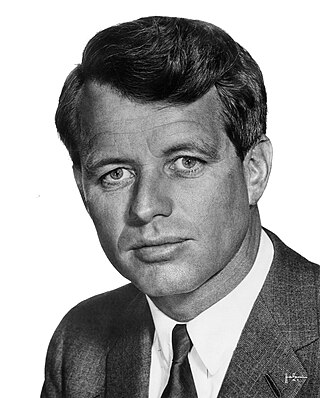
Robert Francis Kennedy, also known by his initials RFK and by the nickname Bobby, was an American politician and lawyer. He served as the 64th United States attorney general from January 1961 to September 1964, and as a U.S. senator from New York from January 1965 until his assassination in June 1968, when he was running for the Democratic presidential nomination. Like his brothers John F. Kennedy and Ted Kennedy, he was a prominent member of the Democratic Party and is an icon of modern American liberalism.
Cyril Manton Harris was Professor Emeritus of Architecture and Charles Batchelor Professor Emeritus of Electrical Engineering at Columbia University. He received his B.S. in mathematics and his M.S. in physics from UCLA, and his Ph.D. in physics from Massachusetts Institute of Technology (MIT), where he specialized in acoustics.
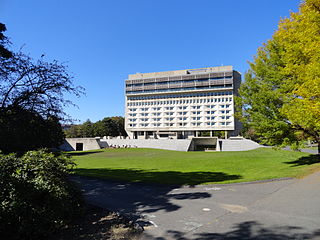
Murray D. Lincoln Campus Center is a high-rise building on the University of Massachusetts Amherst campus, in Amherst, Massachusetts.

The 1968 United States presidential election in Massachusetts took place on November 5, 1968, as part of the 1968 United States presidential election, which was held throughout all 50 states and D.C. Voters chose 14 representatives, or electors to the Electoral College, who voted for president and vice president.

The 1932 United States presidential election in Wyoming took place on November 8, 1932, as part of the 1932 United States presidential election. State voters chose three representatives, or electors, to the Electoral College, who voted for president and vice president.













